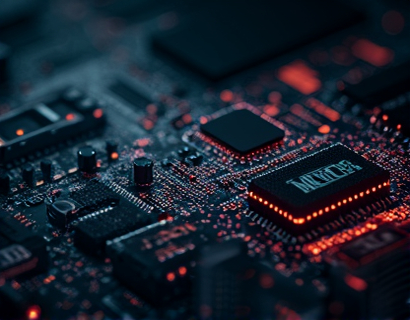Decentralized Transaction Powerhouse: Streamlining Business Logic with Advanced dApp Solutions
The advent of decentralized applications, or dApps, has marked a significant turning point in the evolution of digital commerce and business interactions. These applications leverage blockchain technology to create secure, transparent, and user-centric platforms that are redefining the way transactions are executed. This article delves into the transformative impact of advanced dApp solutions, focusing on how they streamline business logic transactions and empower both individuals and businesses to engage in seamless and efficient digital interactions.
The traditional centralized systems have long been the backbone of business operations, handling everything from financial transactions to supply chain management. However, these systems often suffer from issues such as high transaction costs, slow processing times, and a lack of transparency. The introduction of blockchain technology and dApps addresses these challenges by providing a decentralized alternative that enhances security, reduces costs, and increases efficiency.
At the core of this revolution is the blockchain, a distributed ledger that records transactions across multiple computers in such a way that the registered transactions cannot be altered retroactively. This inherent characteristic of blockchain ensures that all transactions are immutable and transparent, providing a level of trust that is often lacking in centralized systems. dApps build upon this foundation, using smart contracts to automate and enforce business logic transactions.
Smart contracts are self-executing contracts with the terms of the agreement directly written into code. They automatically execute, control, or document legally binding events and actions according to the terms of a contract. In the context of dApps, smart contracts enable the creation of complex business logic transactions that can be triggered and completed without the need for intermediaries. This not only reduces costs but also speeds up the transaction process, making it more efficient and reliable.
One of the key advantages of using dApps for business logic transactions is the enhanced security they offer. Traditional centralized systems are often targets for cyberattacks due to their single point of failure. In contrast, dApps distribute data across a network of nodes, making it extremely difficult for malicious actors to manipulate the system. The decentralized nature of blockchain ensures that no single entity has control over the entire network, thereby minimizing the risk of fraud and data breaches.
Transparency is another critical feature of dApps. Every transaction on the blockchain is recorded and visible to all participants, providing an auditable trail that can be traced back to its origin. This level of transparency builds trust among users, as they can verify the integrity of transactions and the accuracy of data. For businesses, this means reduced disputes and a more streamlined process for resolving issues.
The user experience in dApps is designed to be intuitive and accessible, even for those with limited technical knowledge. User-friendly interfaces and clear guidelines make it easy for individuals and businesses to navigate the platform and execute transactions. This democratization of access ensures that the benefits of decentralized technology are available to a wide range of users, from tech-savvy entrepreneurs to small business owners.
Let's explore some specific scenarios where advanced dApp solutions are making a significant impact. In supply chain management, dApps can track the movement of goods from the manufacturer to the end consumer, ensuring authenticity and reducing counterfeiting. Each step in the supply chain is recorded on the blockchain, providing a transparent and tamper-proof record. This not only enhances trust among stakeholders but also improves efficiency by reducing the need for manual paperwork and verification processes.
In the financial sector, dApps are revolutionizing payment systems by offering faster, cheaper, and more secure transactions. Cross-border payments, which traditionally involve high fees and long processing times, can now be executed almost instantaneously with minimal costs. Smart contracts can automate the transfer of funds based on predefined conditions, eliminating the need for intermediaries such as banks and payment processors.
For businesses, dApps provide a robust platform for automating various operational tasks. For instance, in the realm of human resources, dApps can manage employee onboarding, payroll, and benefits enrollment through smart contracts. This automation reduces administrative burdens and minimizes the risk of errors, ensuring that processes are completed accurately and efficiently.
The integration of dApps with Internet of Things (IoT) devices is another exciting area of development. IoT devices can trigger smart contracts based on real-time data, enabling automated and context-aware transactions. For example, in the energy sector, smart meters can automatically record and settle energy usage and payments, optimizing billing processes and reducing manual interventions.
Moreover, dApps are transforming the way businesses collaborate and interact with each other. Decentralized marketplaces built on blockchain technology allow businesses to connect directly with suppliers, partners, and customers without the need for intermediaries. This not only reduces costs but also fosters a more collaborative and transparent business ecosystem.
The adoption of dApps is not limited to specific industries; it spans across various sectors, including healthcare, real estate, and gaming. In healthcare, dApps can secure patient data and streamline the sharing of medical records among healthcare providers, ensuring privacy and compliance with regulations. In real estate, blockchain-based platforms can simplify property transactions, reducing fraud and increasing the speed of deal closings. In gaming, dApps offer new models for in-game asset ownership and trading, giving players true control over their digital assets.
Despite the numerous benefits, the adoption of dApps is not without challenges. One of the primary hurdles is the technical complexity associated with blockchain and smart contracts. Many businesses and individuals lack the necessary expertise to develop and manage dApps effectively. However, this is an area where specialized services and educational resources are emerging to bridge the knowledge gap.
Another challenge is the regulatory environment. As dApps operate in a relatively new and evolving space, regulatory frameworks are still catching up. Businesses must navigate a complex landscape of laws and regulations that vary by jurisdiction. However, as the technology matures and gains wider acceptance, we can expect more clarity and support from regulatory bodies.
Scalability is also a critical consideration for dApps. While blockchain technology offers many advantages, it can sometimes struggle with high transaction volumes and slow processing times. However, ongoing developments in blockchain scalability solutions, such as layer 2 protocols and sharding, are addressing these issues, making dApps more viable for large-scale applications.
In conclusion, advanced dApp solutions are revolutionizing the way business logic transactions are executed, offering a secure, transparent, and efficient platform for digital interactions. By leveraging blockchain technology and smart contracts, dApps empower individuals and businesses to connect and collaborate in new and innovative ways. As the technology continues to evolve and mature, we can expect to see even more widespread adoption and a significant transformation in the landscape of digital commerce and business operations.










































